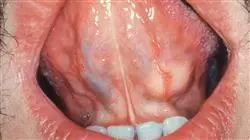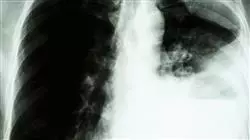University certificate
The world's largest faculty of medicine”
Introduction to the Program
Expand your knowledge in the diagnosis and treatment of the most infrequent cancers, especially those related to the chest wall and head and neck. You will advance in your profession and achieve better results in your patients"

The most recent studies on head and neck tumors, as well as those of the thoracic wall, have shown that professionals must be trained and updated to face the new challenges posed by the sector. Therefore, it is essential to deepen in this field, identifying diagnostic techniques and effective treatments. That is why this Postgraduate certificate will provide all the information that professionals need so much.
On the other hand, during the completion of this program, the student will gain the experience of the multitude of clinical cases that are presented, and will acquire skills in aspects of epidemiology, etiology and pathogenesis, clinical presentation, diagnosis and classification, prognostic factors, treatment and recommendations of clinical guidelines.
Additionally, the professional will have a section dedicated to lung cancer as a paradigm of personalized medicine and will acquire skills in the use of diagnostic techniques and new treatment options. They will also be able to take a tour through the known driver mutations in the context of lung cancer: EGFR, BRAF, MET, KRAS, ALK, ROS-1. And you will learn about the role of translocations and rearrangements or amplifications: NTRK, RET, MET, HER-2.
Finally, students will take a tour of the most infrequent tumors of the otorhinolaryngology and head and neck area, acquiring skills for their diagnosis and treatment: nasopharyngeal carcinoma and salivary gland tumors; nasal and paranasal sinus tumors; melanomas, sarcomas and lymphoproliferative syndromes of the head and neck; dental tumors; ameloblastoma and neuroendocrine tumors of the head and neck.
The experts who belong to the teaching team of this program, all of them referents in each area of knowledge, will develop aspects related to the context of this spectrum of pathologies, will present the clinical and molecular vision of the same, will show their diagnostic and therapeutic approaches and will explain complementary aspects such as their research and institutional environment or the global reality of the patients who suffer from them.
In addition, students will be able to complete the program at their own pace, without being subject to fixed schedules or the travel involved in classroom teaching, so they can combine it with the rest of their daily obligations.
Become an expert on driver mutations in the context of lung cancer: EGFR, BRAF, MET, KRAS, ALK, ROS-1"
This Postgraduate certificate in Tumors of the Pleura, Mediastinum and Chest Wall contains the most complete and up-to-date scientific program on the market. It’s most outstanding features are:
- Case studies presented by experts in oncology
- The graphic, schematic and eminently practical contents with which they are conceived gather scientific and practical information on those disciplines that are essential for professional practice
- News on this type of tumors
- Practical exercises where the self-assessment process can be carried out to improve learning
- Special emphasis on innovative methodologies in the approach to this type of tumors
- Theoretical lessons, questions to the expert, debate forums on controversial topics, and individual reflection work
- Content that is accessible from any fixed or portable device with an Internet connection
The specialization of oncology professionals achieves improvements in the treatment of patients, so it is crucial to continue learning throughout your medical career"
The teaching staff includes professionals from the Oncology sector, who bring their experience to this educational program, as well as renowned specialists from leading societies and prestigious universities.
Its multimedia content, developed with the latest educational technology, will allow the professional a situated and contextual learning, that is, a simulated environment that will provide an immersive training programmed to train in real situations.
The design of this program focuses on Problem Based Learning,
through which the specialist must try to solve the different situations of professional practice that arise throughout the academic program. For this purpose, the professional will be assisted by an innovative interactive video system created by renowned and experienced experts.
Become proficient in the use of diagnostic techniques and new treatment options for tumors of the Pleura, Mediastinum and Thoracic Wall"

This 100% online program will allow you to balalnce your studies with your professional work while increasing your knowledge in this field"
Why study at TECH?
TECH is the world’s largest online university. With an impressive catalog of more than 14,000 university programs available in 11 languages, it is positioned as a leader in employability, with a 99% job placement rate. In addition, it relies on an enormous faculty of more than 6,000 professors of the highest international renown.

Study at the world's largest online university and guarantee your professional success. The future starts at TECH”
The world’s best online university according to FORBES
The prestigious Forbes magazine, specialized in business and finance, has highlighted TECH as “the world's best online university” This is what they have recently stated in an article in their digital edition in which they echo the success story of this institution, “thanks to the academic offer it provides, the selection of its teaching staff, and an innovative learning method aimed at educating the professionals of the future”
A revolutionary study method, a cutting-edge faculty and a practical focus: the key to TECH's success.
The most complete study plans on the university scene
TECH offers the most complete study plans on the university scene, with syllabuses that cover fundamental concepts and, at the same time, the main scientific advances in their specific scientific areas. In addition, these programs are continuously being updated to guarantee students the academic vanguard and the most in-demand professional skills. In this way, the university's qualifications provide its graduates with a significant advantage to propel their careers to success.
TECH offers the most comprehensive and intensive study plans on the current university scene.
A world-class teaching staff
TECH's teaching staff is made up of more than 6,000 professors with the highest international recognition. Professors, researchers and top executives of multinational companies, including Isaiah Covington, performance coach of the Boston Celtics; Magda Romanska, principal investigator at Harvard MetaLAB; Ignacio Wistumba, chairman of the department of translational molecular pathology at MD Anderson Cancer Center; and D.W. Pine, creative director of TIME magazine, among others.
Internationally renowned experts, specialized in different branches of Health, Technology, Communication and Business, form part of the TECH faculty.
A unique learning method
TECH is the first university to use Relearning in all its programs. It is the best online learning methodology, accredited with international teaching quality certifications, provided by prestigious educational agencies. In addition, this disruptive educational model is complemented with the “Case Method”, thereby setting up a unique online teaching strategy. Innovative teaching resources are also implemented, including detailed videos, infographics and interactive summaries.
TECH combines Relearning and the Case Method in all its university programs to guarantee excellent theoretical and practical learning, studying whenever and wherever you want.
The world's largest online university
TECH is the world’s largest online university. We are the largest educational institution, with the best and widest online educational catalog, one hundred percent online and covering the vast majority of areas of knowledge. We offer a large selection of our own degrees and accredited online undergraduate and postgraduate degrees. In total, more than 14,000 university degrees, in eleven different languages, make us the largest educational largest in the world.
TECH has the world's most extensive catalog of academic and official programs, available in more than 11 languages.
Google Premier Partner
The American technology giant has awarded TECH the Google Google Premier Partner badge. This award, which is only available to 3% of the world's companies, highlights the efficient, flexible and tailored experience that this university provides to students. The recognition as a Google Premier Partner not only accredits the maximum rigor, performance and investment in TECH's digital infrastructures, but also places this university as one of the world's leading technology companies.
Google has positioned TECH in the top 3% of the world's most important technology companies by awarding it its Google Premier Partner badge.
The official online university of the NBA
TECH is the official online university of the NBA. Thanks to our agreement with the biggest league in basketball, we offer our students exclusive university programs, as well as a wide variety of educational resources focused on the business of the league and other areas of the sports industry. Each program is made up of a uniquely designed syllabus and features exceptional guest hosts: professionals with a distinguished sports background who will offer their expertise on the most relevant topics.
TECH has been selected by the NBA, the world's top basketball league, as its official online university.
The top-rated university by its students
Students have positioned TECH as the world's top-rated university on the main review websites, with a highest rating of 4.9 out of 5, obtained from more than 1,000 reviews. These results consolidate TECH as the benchmark university institution at an international level, reflecting the excellence and positive impact of its educational model.” reflecting the excellence and positive impact of its educational model.”
TECH is the world’s top-rated university by its students.
Leaders in employability
TECH has managed to become the leading university in employability. 99% of its students obtain jobs in the academic field they have studied, within one year of completing any of the university's programs. A similar number achieve immediate career enhancement. All this thanks to a study methodology that bases its effectiveness on the acquisition of practical skills, which are absolutely necessary for professional development.
99% of TECH graduates find a job within a year of completing their studies.
Postgraduate Certificate in Tumors of the Pleura, Mediastinum and Chest Wall
Thoracic tumors, both of the pleura, mediastinum and chest wall, are increasingly frequent and complex pathologies that require a multidisciplinary approach. Therefore, at TECH Global University we have designed a Postgraduate Certificate in Tumors of the Pleura, Mediastinum and Chest Wall. Lung Cancer as a Paradigm of New Rare Tumors but not Orphan Tumors, focused on updating knowledge about these diseases. This course will delve into the latest advances in diagnosis, treatment and follow-up of thoracic tumors, in addition to including key aspects such as thoracic radiology, pulmonary pathology and thoracic surgery. The Postgraduate Certificate is completely virtual and brings together the most sophisticated learning techniques, with a select curriculum that addresses in various modules everything you need to know about tumors of the pleura, mediastinum and chest wall. Our curriculum makes use of state-of-the-art graphic, audiovisual and interactive material, which you will have within reach of any device connected to the internet.
Specialize in thoracic tumors
Why choose us? Because not only do we have significant academic experience endorsed by major educational organizations and international media such as Forbes, but we offer 100% online professionalization with infallible results. During the training, topics such as diagnostic imaging of thoracic tumors, anatomy and physiology of the mediastinum, different biopsy techniques and chest pain management, among others, will be addressed. Likewise, the most current surgical, radiotherapeutic and pharmacological treatments in this area of medicine will be studied in depth. With this academic update program, you will be able to improve your skills and knowledge in the field of thoracic oncology, which will allow you to offer a better approach and treatment to your patients, while improving your job opportunities in the sector.







